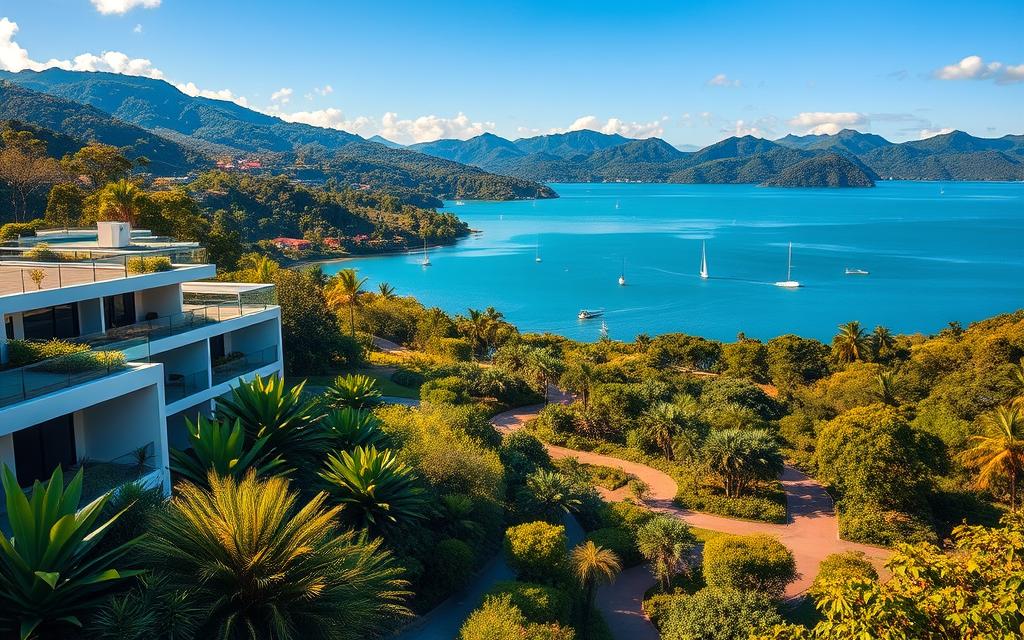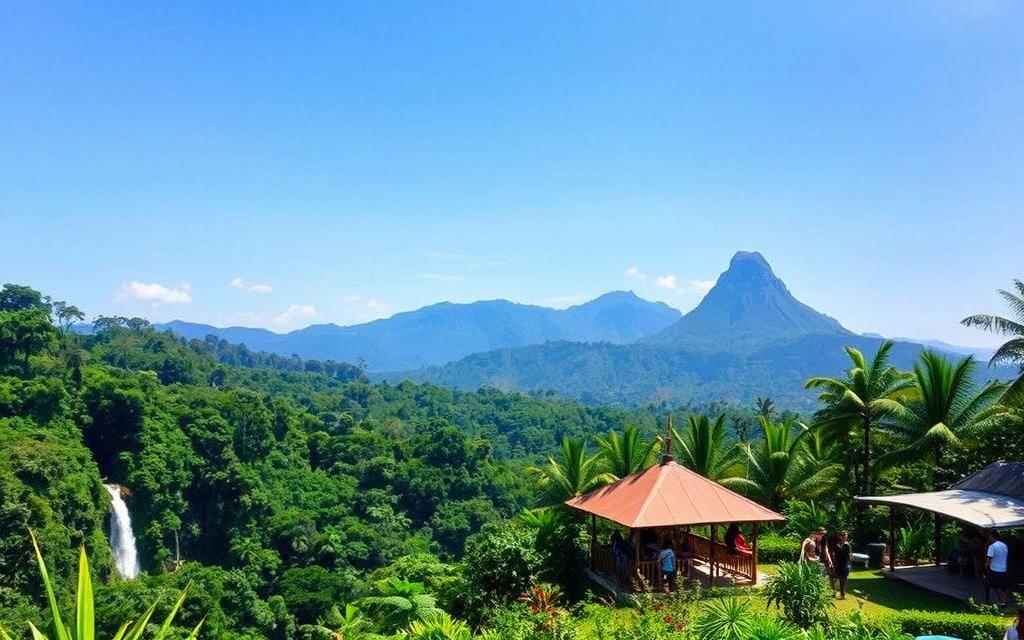Can Permanent Residents Work in Costa Rica? Costa Rica Residency

Over 100,000 foreigners have chosen to call Costa Rica home, drawn by its stunning natural beauty, stable climate, and welcoming culture. This Central American gem offers a peaceful lifestyle, making it an attractive destination for individuals and families alike.
For those considering a long-term stay, Costa Rica provides various residency options. These include rentista, investor, and family-based pathways. Each option comes with its own set of benefits, making it easier to find the right fit for your needs.
Obtaining a provisional visa is the first step toward securing your stay. Once you achieve permanent residency, you gain nearly all the rights enjoyed by citizens, including the ability to work without restrictions. This makes it an appealing choice for those looking to build a life in this vibrant country.
In this article, we’ll explore the application process, required documents, and the differences between residency types. Whether you’re planning to retire, invest, or reunite with family, Costa Rica offers a pathway to make your dreams a reality.
Understanding Costa Rica Residency Options

Costa Rica offers diverse residency options tailored to different lifestyles and financial situations. Whether you’re retiring, investing, or reuniting with loved ones, there’s a pathway designed for you. Let’s explore the primary categories: rentista, investor.
Rentista, Investor.
The rentista option is ideal for those with a reliable monthly income. Applicants must show proof of $2,500 monthly income for two years or a $60,000 bank deposit. This pathway is perfect for individuals who want to enjoy Costa Rica’s lifestyle without active employment.
Benefits of Each Residency Type
Rentista residency provides flexibility and financial independence and peaceful environment. The process is straightforward.
Investor residency opens doors to business opportunities and tax benefits. By investing in Costa Rica, you support local development while securing your future. This option is ideal for entrepreneurs and visionaries.
For more details on the legal requirements for residency in Costa, consult our comprehensive guide. Each option has specific criteria, but all lead to the same goal: a fulfilling life in this beautiful country.
Overview of Residency in Costa Rica: Benefits and Lifestyle

Living in Costa Rica offers a unique blend of natural beauty and modern convenience. The country’s mild climate and stunning landscapes create an ideal environment for a balanced lifestyle. Whether you’re exploring lush rainforests or relaxing on pristine beaches, every day feels like a new adventure.
Residency in Costa Rica provides more than just legal security. It opens doors to a vibrant culture and a welcoming community. Many people find that their quality of life improves significantly after moving here. The country’s emphasis on family values and work-life balance is a major draw.
For those interested in business, Costa Rica offers numerous opportunities. The growing economy and supportive policies make it an attractive destination for entrepreneurs. Digital nomads and remote workers also thrive here, thanks to reliable internet and a low cost of living.
Over time, residents enjoy access to affordable healthcare and education. The public healthcare system is highly regarded, ensuring peace of mind for families. Additionally, the country’s low crime rate contributes to a safe and secure environment.
Whether you’re investing in real estate or starting a new venture, residency in Costa Rica provides long-term benefits. It’s a place where you can build a fulfilling life .
Can permanent residents work in Costa Rica?

Can permanent residents work in Costa Rica? Rica’s residency programs open doors to diverse opportunities for those seeking a new chapter in life. One of the most significant benefits of achieving permanent residency is the freedom to pursue employment without restrictions. This contrasts sharply with the limitations faced by temporary residents, who must navigate additional requirements to secure work permits.
Employment Rights for Permanent Residents
Once granted permanent residency, individuals enjoy nearly the same employment rights as citizens. They can freely seek jobs, start businesses, or work independently without needing additional permits. This flexibility makes it an attractive option for those looking to build a career in the country.
Permanent residents also benefit from streamlined processes. Unlike temporary residents, they don’t need to prove that their position couldn’t be filled by a local worker. This eliminates a significant barrier to employment and allows for quicker integration into the workforce.
Comparison to Work Permits for Temporary Residents
Temporary residents face stricter requirements when seeking employment. They must apply for a work permit, which involves demonstrating that their role cannot be filled by a Costa Rican citizen. This process often requires additional documentation, such as proof of qualifications and a job offer from a local employer.
The cost and time associated with obtaining a work permit can also be a challenge. Fees for application, processing, and government approvals can add up, and the process may take several months. For those on a tight timeline, these hurdles can delay their ability to start working.
In contrast, permanent residents bypass these complexities. Their status grants them immediate access to the job market, making it easier to accept offers and begin working right away. This distinction highlights the advantages of pursuing permanent residency for those planning long-term employment in the country.
Temporary vs. Permanent Residency: Key Differences
Understanding the differences between temporary and permanent residency is crucial for planning your future in Costa Rica. Each option comes with distinct eligibility criteria, durations, and renewal processes. Knowing these details helps you make informed decisions about your long-term stay.
Eligibility Requirements
Temporary residency is often the first step for many newcomers. It requires proof of income, such as $2,500 monthly for rentista or a $150,000 investment for the investor category. Applicants must also provide documentation like a criminal record.
Permanent residency, on the other hand, is available after holding temporary status for three consecutive years. Alternatively, those with family ties to a Costa Rican citizen can apply directly. This pathway offers greater stability and fewer restrictions.
Duration and Renewal Processes
Temporary residency typically lasts two years and requires renewal. The process involves submitting updated documents and paying associated fees. It’s essential to plan ahead to avoid gaps in your legal status.
Permanent residency, however, does not expire. Once granted, you can stay indefinitely without the need for renewal. This makes it an ideal choice for those committed to building a life in Costa Rica.
For more insights into the differences between residency types, explore our detailed guide. Understanding these factors ensures a smooth transition to your new home.
Step-by-Step Guide to the Application Process
Navigating the residency application process in Costa Rica can seem daunting, but with the right guidance, it becomes manageable. Whether you’re applying from abroad or starting after arrival, understanding the steps ensures a smooth experience.
Applying from Abroad
Begin by obtaining a provisional visa from a Costa Rican consulate in your home country. This visa allows you to enter and start the residency process. Gather essential documents, including your passport, birth certificate, and police records. Ensure all foreign documents are Apostilled or verified by a Costa Rican consulate.
If your documents are not in Spanish, have them translated by a certified translator fron Costa Rica. This step is crucial for meeting immigration requirements. Once your paperwork is ready, submit it to the consulate along with your visa application. This sets the foundation for your residency journey.
After Arrival in Costa Rica
Once you arrive, the next step is to register your fingerprints with the Immigration Department. This is a mandatory part of the process. Prepare a letter of application detailing your reasons for seeking residency. Include recent photos and proof of income or investment, depending on your chosen category.
Submit your completed application to the Immigration Department. Ensure all documents are organized and meet the specified criteria. Processing times vary, so patience is key. You’ll receive updates on your application status, and once approved, you can enjoy the benefits of residency.
For more insights into the residency application process, explore our comprehensive guide. Following these steps carefully will help you achieve your goal of living in this beautiful country.
Important Documents and Legal Requirements
Preparing the right documentation is a critical step in securing residency in Costa Rica. Proper paperwork ensures a smooth application process and helps avoid unnecessary delays. Let’s explore the essential documents and legal requirements you’ll need to meet.
Required Paperwork and Translations
To apply for residency, you’ll need several key documents. These include a valid passport, notarized copies of your birth certificate, and police clearance certificates. Each document must be current and meet specific legal standards.
If your documents are not in Spanish, certified translations are mandatory. Translations must be completed by a recognized translator and often require notarization. This ensures that all paperwork is legally valid for submission.
Additional documents may include proof of income, marriage certificates, and a letter of application. These help demonstrate your eligibility and provide a complete picture of your situation. Gathering these materials in advance can save time and effort.
It’s also important to note that foreign documents must be Apostilled or legalized by a Costa Rican consulate. This step verifies their authenticity and ensures they meet local requirements. Proper legalization is essential for a successful application.
For more details on the legal requirements for residency, consult our comprehensive guide. Understanding these steps will help you prepare effectively and avoid common pitfalls.
Navigating Work Permits and Employment Rights
For temporary residents, obtaining legal employment in Costa Rica requires a separate work permit. This process ensures that local job opportunities are prioritized for citizens while allowing skilled foreign workers to contribute to the economy.
Obtaining a Work Permit for Temporary Residents
Temporary residents must secure a work permit to legally take on employment. The application is submitted by the employer, who acts as the guarantor. This ensures that the process is managed by a local entity familiar with immigration requirements.
Employers must provide proof of economic solvency and compliance with tax and insurance regulations. Additionally, they must demonstrate that the role cannot be filled by a qualified Costa Rican citizen. This often involves submitting detailed job descriptions and evidence of the applicant’s unique skills.
Special Categories and Unique Visa Options
Costa Rica provides unique visa categories tailored to specific lifestyles and financial goals. These options go beyond standard residency pathways, offering flexibility and opportunities for those with distinct needs. Whether you’re retiring, investing, or relying on steady income, there’s a visa designed for you.
Retiree Visa
The retiree visa, also known as the pensionado category, is ideal for those with a reliable pension. Applicants must show proof of at least $1,000 in monthly income. This visa offers benefits like tax exemptions on imported household goods and vehicles, making it a popular choice for retirees.
Rentista Visa
For individuals with steady, passive income, the rentista visa is a perfect fit. Applicants must demonstrate $2,500 in monthly income or a $60,000 bank deposit. This category provides financial independence and the freedom to enjoy Costa Rica’s lifestyle without active employment.
Investor Visa
The investor visa requires a minimum investment of $150,000 in real estate or eligible projects. This option not only grants residency but also opens doors to business opportunities and tax benefits. It’s a strategic choice for those looking to grow their wealth while living in a tropical paradise.
Marriage-based applications can also fall under these categories, offering additional flexibility for couples. Each visa type has its own advantages and limitations, so it’s essential to choose the one that aligns with your goals. For more details on transitioning from a tourist to a resident, explore our comprehensive guide.
Living, Working, and Investing in Costa Rica
Costa Rica’s growing appeal as a hub for digital nomads and entrepreneurs is reshaping its economic landscape. With its reliable internet, affordable living costs, and stunning natural beauty, it’s no wonder this country attracts professionals from around the globe. Whether you’re a remote worker, startup founder, or investor, Costa Rica offers a wealth of opportunities.
Opportunities for Digital Nomads and Remote Workers
For digital nomads, Costa Rica provides an ideal environment to thrive. The country’s technological infrastructure supports remote work, with high-speed internet available in most urban and tourist areas. Additionally, the cost of living is significantly lower than in many Western countries, making it an attractive destination for those seeking a balanced lifestyle.
The government has also introduced initiatives to support remote workers, such as the Digital Nomad Visa. This visa requires proof of a stable monthly income, ensuring financial stability while allowing individuals to enjoy the country’s vibrant culture and natural wonders. Networking events and coworking spaces further enhance the experience, fostering connections within the expat and local communities.
Favorable Business Environment
Costa Rica’s business-friendly policies make it a prime location for entrepreneurs. The process of establishing a company is straightforward, often completed in just a few days with proper legal guidance. Corporate tax rates are competitive, with small businesses benefiting from lower rates compared to larger enterprises.
Investment opportunities abound, particularly in real estate and tourism. Long-term investments in properties can yield impressive returns, especially in popular tourist areas. The country’s stable economy and growing tourism sector create a fertile ground for business growth and innovation.
Actionable Advice for Newcomers
If you’re considering moving to Costa Rica, start by researching the visa options that best suit your needs. For remote workers, the Digital Nomad Visa is a great choice. Entrepreneurs should explore the investor visa, which requires a minimum investment but offers long-term benefits.
Networking is key to success. Attend local events and join online communities to connect with like-minded individuals. Finally, consult with legal and immigration experts to ensure a smooth transition. Costa Rica’s welcoming environment and abundant opportunities make it a place where you can live, work, and invest with confidence.
How to Engage with Local Legal and Immigration Experts
Navigating the legal and immigration landscape in Costa Rica can be complex, but partnering with local experts ensures a smoother journey. Professional advice can prevent costly errors and streamline the application process, making it easier to achieve your goals.
When to Seek Professional Advice
There are specific situations where consulting a legal or immigration expert is essential. For instance, if you’re unsure about documentation requirements or need help interpreting local laws, professionals can provide clarity. Their expertise ensures that your application meets all legal standards.
Another critical time to seek advice is when transitioning from temporary to permanent residency. Experts can guide you through the process, ensuring all steps are completed correctly. This reduces the risk of delays or rejections.
Benefits of Consulting Immigration Experts
Working with immigration professionals offers numerous advantages. They can help you avoid common pitfalls, such as incomplete paperwork or missed deadlines. Their knowledge of local regulations ensures that your application is accurate and compliant.
Experts also save you time by handling complex tasks, such as document translations or legalizations. This allows you to focus on other aspects of your move, such as finding a place to live or settling into your new community.
Finding Reputable Legal and Consultancy Services
When choosing a legal or immigration service, it’s important to do your research. Look for professionals with a proven track record and positive client reviews. Recommendations from expats or online forums can also be helpful.
Ensure that the service you choose is licensed and experienced in Costa Rican immigration law. Open communication is key, so select a provider who is responsive and willing to answer all your questions.
Success Stories and Final Tips
Many applicants have successfully navigated the residency process with the help of experts. Their stories highlight the value of professional guidance in achieving a stress-free experience.
To make the most of your consultation, come prepared with all necessary documents and a list of questions. This ensures that your session is productive and addresses all your concerns. By partnering with the right experts, you can confidently move forward with your plans in Costa Rica.
Tips for Families and Dependents Managing Residency
Moving to a new country with your family requires careful planning, especially when it comes to residency. Costa Rica offers pathways to ensure spouses and dependents are included in the application process. Understanding the requirements and benefits can make the transition smoother for everyone involved.
Including Spouses and Children Under 25
Family-based residency allows spouses and children under 25 to join their loved ones in Costa Rica. To include dependents, applicants must provide proof of income to ensure financial stability. This pathway strengthens family bonds while offering access to the country’s vibrant culture and lifestyle.
For children over 25 with disabilities, special considerations apply. Documentation proving the disability and dependency is required. This ensures that all family members can stay together, regardless of age or circumstances.
Required Documents and Eligibility
To apply for family-based residency, you’ll need specific documents. These include marriage certificates, birth certificates, and police clearance records. All foreign documents must be Apostilled or legalized by a Costa Rican consulate.
Health insurance valid in Costa Rica is also mandatory. This ensures that your family has access to healthcare during the transition. Gathering these materials in advance can save time and prevent delays.
Cost Implications and Renewals
Family-based residency involves fees for application processing and document legalization. These costs vary depending on the number of dependents included. During renewals, updating dependent status may require additional documentation and fees.
Planning ahead for these expenses ensures a smooth process. It’s also important to stay informed about any changes in immigration policies that may affect your application.
Preparing a Strong Application
To strengthen your application, ensure all documents are complete and accurate. Translations of foreign documents must be certified and notarized. Including a detailed letter of application can also help clarify your family’s situation and needs.
Consulting with immigration experts can provide additional support. They can guide you through the process, ensuring all requirements are met. This increases the chances of a successful outcome for your family.
Conclusion
Exploring residency options in this Central American country opens doors to a fulfilling lifestyle. Whether you choose temporary or permanent status, each option comes with distinct benefits. Permanent residency grants full employment rights, eliminating the need for a separate permit.
The application process involves gathering key documents and meeting specific criteria. From proof of income to legalized paperwork, preparation is essential. Choosing the right pathway ensures a smooth transition and aligns with your personal and professional goals.
For more detailed information on legal requirements for residency, consult our expert guide. Seeking professional advice can simplify the process and help you make informed decisions. Start your journey today and embrace the opportunities this vibrant country has to offer.


